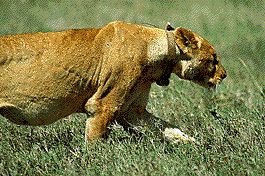The units of selection - Adaptation benefits . . . what exactly?

Lions hunt in groups
The issue can be made clearer in an example. Let us consider the adaptations that can be seen when lions go on a hunt. Lions often hunt alone, but they can improve their chance of success by hunting in a group. Here is part of a description of a group of hunting lions, by Bertram.
"When prey have been detected, a wildebeest herd perhaps, the lions start to stalk towards them. As they get close, they take different routes, some going on straight ahead, and some to the sides, so the prey herd is approached by lions stalking them from different directions... Eventually one lion gets close enough to make a rush at a wildebeest, or else a lion is detected by the prey."
Then the trap is sprung. Panicked wildebeest run in all directions, some of them into the reach of other lions. The co-operative behavior of the hunting party is here an adaptation for catching food; but it is not the lion's only feeding adaptation. The lions' muscular jaws and limbs, their teeth and five senses, all contribute to the success of the hunt. Lions are well adapted for feeding: although some hunts are unsuccessful, and individual lions may starve to death, the lions in the Serengeti Plains of Kenya spend about 20 hours a day in rest or sleep, and only one hour a day on average in hunting. Visitors tend to think lions are lazy.
When a lion hunt is successful, who, or rather what, benefits?
• the individual? Each lion gets fed, so yes.
• the pride? All lions get a share of the kill, so yes.
• the species? Each time a hunt is successful, there will be a small incremental increase in the species Felis leo 's chance of survival, or avoiding extinction.
• the genus? The survival probability will also be increased, if by a smaller amount, for the genus Felis and the cat family Felidae .
• the class? Almost all the Serengeti lions' food is made up of other mammals, so when we reach the class Mammalia, the effect of the hunt has probably become neutral: the lion's gain is the wildebeest or the zebra's loss and the chance of survival of the class Mammalia is more or less unaffected.
The beneficial effect of the hunt spreads downwards as well as up from the individual lion. As the survival of the lion is increased, so is the survival of its constituents. The lion's organs, cells, proteins, and genes, are all more likely to survive every time a lion hunt is successful. (Though if we trace the effect down through the nucleotides and their constituent atoms, it again disappears. A lion's atoms survive just as well whether it is alive and well fed or dead due to starvation.)
| Next |



